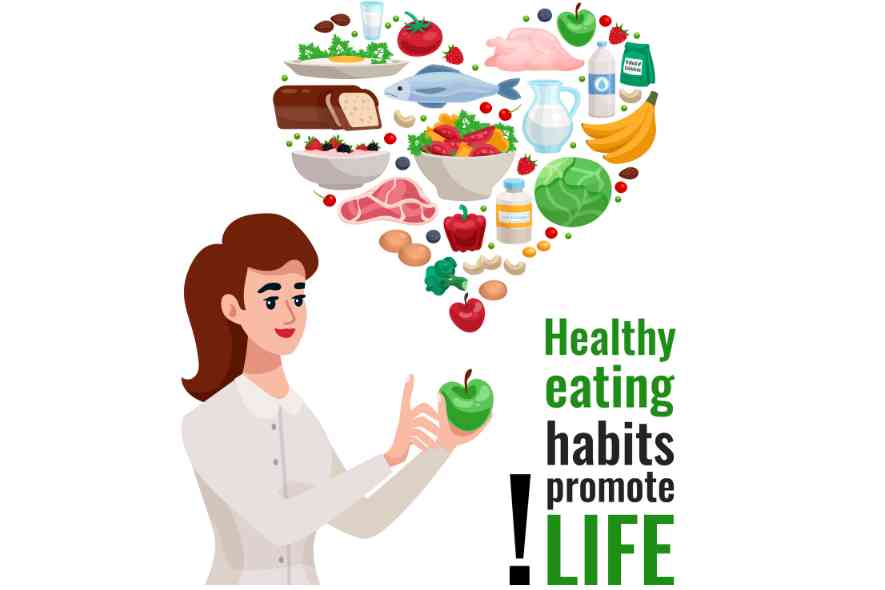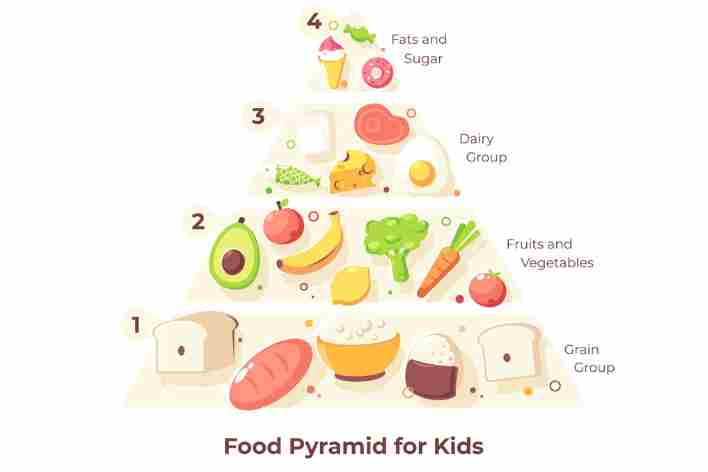Common Nutritional Concerns for Kids
By Pinkey Sharma |
Date 08-08-2024

Table of Contents
Admissions Open for
One of the basic factors in a child's growth and development is making sure that he gets proper nourishment. Unfortunately, many children become victims of nutritional deficiency, which damages their health and leads to nutritional disorders. We will highlight in this blog some common nutritional problems in kids, nutritional or deficiency diseases, healthy meal plans, and some useful tips on management of childhood obesity, vitamin, and mineral enrichment, and food allergy management.
Good nutrition is essential if every child is to reach his/her full potential physically and developmentally. Children with special health care needs are more vulnerable to nutrition-related problems than other children because of the following factors:
-
Physical conditions or disabilities adversely affect ingestion, digestion, or absorption of nutrients.
-
Long-term drug imbalances or internally caused metabolic disorders resulting in biochemical imbalances.
-
Having an illness, obviously be it physical or a chronic condition, causes so much psychological strain that the child loses their appetite and tends to avoid food.
-
Environmental factors prone to impact the provisioning and food consumption of children.
Things may go wrong with a child's diet for a number of reasons. Here are a few of the most common problems:

Nutritional Disorders in Children
Primary Nutritional Deficiency Diseases in Kids
-
Iron Deficiency Anemia: This is a situation whereby there is a lack of iron and, as such, a poor flow of oxygen within the blood.
-
Vitamin D Deficiency: It causes rickets in children. It is a condition whereby their bones are weak, soft, and can easily get deformed.
-
Calcium Deficiency: The conditions contribute to weak bones and Lameness.
-
Vitamin A Deficiency: This results in vision problems including night blindness, besides annealing one to infections.
-
Zinc Deficiency: The resulting conditions from zinc deficiency include growth retardation, immune dysfunction, or defacing of the immune response.
-
Iodine deficiency: This causes goiter and developmental abnormalities.
-
PEM (protein-energy malnutrition): Marasmus and kwashiorkor are severe disorders characterized by wasting and swelling.
-
Folate deficiency: Causes anemia and developmental problems.
-
Vitamin B12 deficiency: Cause of anemia and neurological problems.
-
Obesity : It can be defined as an increase in fat stores. If obese during childhood, this increases the person's likelihood to become obese in adulthood and also increases the risk for obesity-associated diseases.
Other widespread issues related to malnutrition in children that are observed globally include:
- Growth that is delayed, underweight, and overweight.
- Oral-motor issues, delayed feeding, or changed feeding interactions.
- An unhealthy or excessively large or high-quality diet.
- Interactions between medication and nutrients.
- Constipation and diarrhea are examples of elimination issues.
- Modified requirements for energy and minerals, or innate metabolic faults.
- Inadequate or overindulgent appetite.
- Youngsters using vegan diets may not receive enough nutrients.
Healthy Diet Plan for Kids
A balanced diet is essential for children to prevent nutritional disorders and promote overall health. Here’s a healthy diet plan that ensures kids receive the nutrients they need:
-
Balanced Meals: A variety of foods from all food groups should be taken—fruits, vegetables, grains, proteins, and dairy.
-
Portion Control: The serving should be according to the age. Prevents overeating.
-
Hydration: Encourage water intake and limit sweetened beverages.
-
Regular Meals: Three main meals and two healthy snacks in a day should be done.
-
Limit Processed Foods: Processed and junk foods, which have a high dosage of sugar, salt, and unhealthy fats, are to be limited.
-
Healthy Fats: Intake through avocados, nuts and seeds, olive oil.
-
Whole Grains: Instead of refined, use whole grain.
-
Lean Proteins: Add chicken, fish, beans, legumes as good sources.
-
Dairy or Alternatives: Either milk, yogurt, or cheese; with calcium supplements from the plant-based.
-
Variety of Fruits and Veggies: Colorful plate for different vitamins and minerals intake.

Key Points on Nutritional Concerns
What Do Parents Need to Know About Childhood Obesity and Its Prevention?
Childhood obesity indicates that a child will begin to experience serious health problems right from childhood, ranging from diabetes and heart diseases to psychological problems later down the line. Parents must ensure:
-
Increase Physical Activity: Encourage at least 60 minutes of moderate to vigorous physical activity per day.
-
Healthy eating: Try to complete your diet and avoid foods with too many calories, low in nutrients.
-
Family Meals: Eat together to monitor what is eaten and to encourage healthy eating.
-
Limit Screen Time: This means cutting down the time a child spends watching TVs and playing video games, probably two of the biggest sedentary activities.
-
Be a Role Model: Show children healthy eating and active living habits.
When to visit a physician?
If you have any concerns about your child's general health, weight, or food, you should take them to see a general practitioner. If you need extra help making sure your child gets a balanced diet, your general practitioner can put you in touch with a nutritionist.
See your general practitioner (GP) if your kid or adolescent:
-
is underweight or overweight;
-
avoids certain food categories or restricts their diet;
-
has allergies or food intolerances;
-
has an imbalanced diet and you're worried about nutritional deficits.
How can I make sure my child is getting enough vitamins and minerals?
Since vitamins and minerals are essential for children's development, parents should ensure that they get their daily doses. Here are some ways to do it:
- Eat a Variety: Offer a variety of foods to cover all the bases of nutrients.
- Boosted Foods: Opt for foods with extra boosts of key vitamins and minerals. Examples may be fortified cereals or fortified milk.
- Supplemental Help: Talk to the pediatrician about multivitamin supplements if your child is not getting enough in their diet.
- Educate on Nutrition: Make children aware of the requirement of various nutrients through such activities as encouraging the intake of different foods.
- Regular Health Check-ups: Upon reaching school age, regular health check-ups become extremely important for monitoring growth and checking on nutrient status.
What are some risks of food allergies, and how might they be managed?
Food allergy management is a serious business. Parents should be able to:
-
Identify Allergies: Be aware of common allergens, such as peanuts, tree nuts, milk, eggs, soy, wheat, fish, and shellfish.
-
Read Labels: Always read the labels on foods for potential allergens. Action plan and emergency medication like an epinephrine auto-injector should always be on hand if your child has a specific known allergy.
-
Educate Caregivers: Educate teachers, babysitters, or other caregivers about your child's allergies and the management plan in place.
-
Safe Foods: Maintain a supply of safe foods at home and in the school.
-
Monitoring Regularly: From time to time monitoring by an allergy specialist is necessary for your child with food allergies to provide the right kind of treatment.
Conclusion
Addressing common kid-related nutrition concerns is critical for growth, proper development, and long-term health. Children are at a very critical stage in their lifetime when proper nutrition can set a foundation for a healthy future that is bereft of chronic diseases and developmental issues. Therefore, recap the key points and understand why it is of prime importance that action needs to be taken now.
Equally important would be an understanding of various nutritional disorders and deficiencies. Conditions involving iron deficiency anemia, inborn errors of metabolism, rickets, calcium deficiency, and others may have long-term implications for a child's physical and neurological development. Such deficiencies frequently manifest with complaints of tiredness, weakened immunity, poor bone health and developmental delay. One becomes alive to those signs, after which parents should take early and proactive measures to rectify such flaws.
A healthy diet plan in children is not simply a question of ensuring the intake of the right food, but lays down lifelong eating habits. A balanced diet of fruits, vegetables, whole grains, lean proteins, and dairy will provide an adequate amount of all types of nutrients needed by growing children. Proper portions and a regular meal schedule will prevent obesity and malnourishment at the very outset and therefore should be inculcated to have a benevolent relationship with food throughout life.
FAQ'S
What is a major nutrition related concern for preschoolers?
Poor diets in early childhood can lead to deficiencies in essential vitamins and nutrients – such as vitamin A deficiency, which weakens children's immunity, increases their risk of blindness and can lead to death from common childhood diseases like diarrhea.
What are the nutritional concerns of school going children?
Energy (Calorie): Energy required for growth and physical activity and proper brain functioning. The sources of energy are Cereals, grains, pulses, vegetables etc. Protein is responsible for bodybuilding, maintaining bodily functions and repairing body tissues.
What are the most common nutrient deficiencies in children?
School-age children most frequently have shortages in calcium, fiber, folate, iron, magnesium, potassium, and vitamin E. According to reports, iron and vitamin D deficits are the two most prevalent deficiencies observed in children who are otherwise healthy.
How many calories should my child consume a day?
The consumption of calories your child consumes will depend on their gender, age, and activity level. A recommended calorie range for kids between 6-12 years old is between 1600-2200 per day.
How can I prevent my child from becoming overweight or obese?
To help your child maintain a healthy weight they must be eating a healthy, balanced diet with fruits, vegetables, whole grains, and lean sources of protein. Make sure that they are also getting at least one hour of physical activity every day. Limit sugar and processed foods.
Is fruit juice healthy?
Many people seem to think that juice is healthy, and while it does contain vitamin C, there are certainly better sources for ensuring your child gets enough of this important nutrient. Today, most fruit juices found at the grocery store are chock full of sugar and can contribute to weight gain and increase the risk for cavities. A better alternative is whole fruits since they provide more nutritional value than juice will.
Liked what you read? Feel free to share this article with your friends and spread the knowledge!
Related Blogs
Health and Nutrition for Kids: Benefits of nutrition for children's growth and development.
Oral health and hygiene: Discover valuable tips for maintaining oral health and hygiene.
Supporting children's health: How schools and local groups ensure kids' well-being.
CBSE Schools In Popular Cities
- CBSE Schools in Bangalore
- CBSE Schools in Mumbai
- CBSE Schools in Pune
- CBSE Schools in Hyderabad
- CBSE Schools in Chennai
- CBSE Schools in Gurgaon
- CBSE Schools in Kolkata
- CBSE Schools in Indore
- CBSE Schools in Sonipat
- CBSE Schools in Delhi
- CBSE Schools in Rohtak
- CBSE Schools in Bhopal
- CBSE Schools in Aurangabad
- CBSE Schools in Jabalpur
- CBSE Schools in Jaipur
- CBSE Schools in Jodhpur
- CBSE Schools in Nagpur
- CBSE Schools in Ahmednagar
- CBSE School In Tumkur

Call Us to know more about Orchids
Swipe Up

















